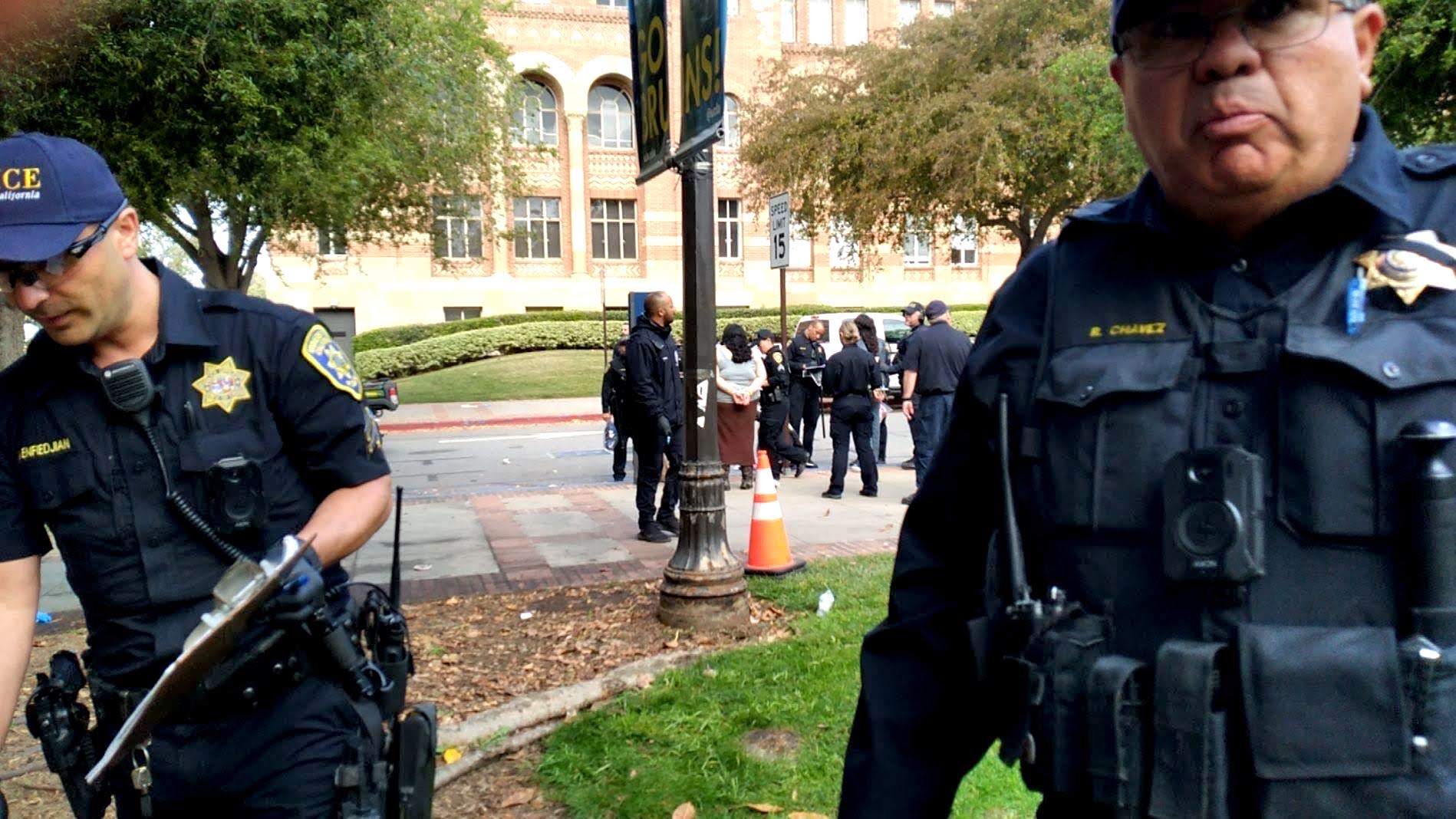
Los Angeles Police Department arresting student protesters at UCLA, May 2, 2024. (By Multiple authors/Darlene L, Matt Baretto, Wikimedia Commons, CC BY 4.0)
Sustained pushback against campus repression will be essential to upholding the right to protest as guaranteed by the First Amendment, writes Norman Solomon.
By Norman Solomon
Common Dreams
 With nearly 18 million students on U.S. college campuses this fall, defenders of the war on Gaza don’t want to hear any backtalk. Silence is complicity, and that’s the way Israel’s allies like it.
With nearly 18 million students on U.S. college campuses this fall, defenders of the war on Gaza don’t want to hear any backtalk. Silence is complicity, and that’s the way Israel’s allies like it.
For them, the new academic term restarts a threat to the status quo. But for supporters of human rights, it’s a renewed opportunity to turn higher education into something more than a comfort zone.
In the United States, the extent and arrogance of the emerging collegiate repression is, quite literally, breathtaking. Every day, people are dying due to their transgression of breathing while Palestinian.
The Gaza death toll adds up to more than one Kristallnacht per day — for upwards of 333 days and counting, with no end in sight.
The shattering of a society’s entire infrastructure has been horrendous. Months ago, citing data from the Palestinian Central Bureau of Statistics, ABC News reported that “25,000 buildings have been destroyed, 32 hospitals forced out of service, and three churches, 341 mosques and 100 universities and schools destroyed.”
Not that this should disturb the tranquility of campuses in the country whose taxpayers and elected leaders make it all possible. Top college officials wax eloquent about the sanctity of higher learning and academic freedom while they suppress protests against policies that have destroyed scores of universities in Palestine.
VIDEO: Columbia University Alma Mater statue dripping in red paint on the first day of fall classes as students protest against the university’s continue support for genocide.
Provided anon. https://t.co/ryMQTg2eeJ pic.twitter.com/IaHmQEXBKr
— Talia Jane ???? (@taliaotg) September 3, 2024
A key rationale for quashing dissent is that anti-Israel protests make some Jewish students uncomfortable. But the purposes of college education shouldn’t include always making people feel comfortable. How comfortable should students be in a nation enabling mass murder in Gaza?
What would we say about claims that students in the North with southern accents should not have been made uncomfortable by on-campus civil rights protests and denunciations of Jim Crow in the 1950s and 1960s? Or white students from South Africa, studying in the United States, made uncomfortable by anti-apartheid protests in the 1980s?
A bedrock for the edifice of speech suppression and virtual thought-policing is the old standby of equating criticism of Israel with anti-Semitism. Likewise, the ideology of Zionism that tries to justify Israeli policies is supposed to get a pass no matter what — while opponents, including many Jews, are liable to be denounced as anti-Semites.
But polling shows that more younger Americans are supportive of Palestinians than they are of Israelis. The ongoing atrocities by the Israel “Defense” Forces in Gaza, killing a daily average of more than 100 people — mostly children and women — have galvanized many young people to take action in the United States.
“Protests rocked American campuses toward the end of the last academic year,” a front-page New York Times story reported in late August, adding:
“Many administrators remain shaken by the closing weeks of the spring semester, when encampments, building occupations and clashes with the police helped lead to thousands of arrests across the country.”
(Overall, the phrase “clashes with the police” served as a euphemism for police violently attacking nonviolent protesters.)
UCLA counter-protests got bloody. Our @CNN investigation shows you who was behind the violence — and the ones ID'ed not all students. Video w/@pdicarlocnn @annamajacnn @alligordon @yahyaghazala pic.twitter.com/FTy0smKGoA
— Kyung Lah (@KyungLahCNN) May 16, 2024
From the hazy ivory towers and corporate suites inhabited by so many college presidents and boards of trustees, Palestinian people are scarcely more than abstractions compared to far more real priorities. An understated sentence from the Times sheds a bit of light:
“The strategies that are coming into public view suggest that some administrators at schools large and small have concluded that permissiveness is perilous, and that a harder line may be the best option — or perhaps just the one least likely to invite blowback from elected officials and donors who have demanded that universities take stronger action against protesters.”
Much more clarity is available from a new Mondoweiss article by activist Carrie Zaremba, a researcher with training in anthropology. “University administrators across the United States have declared an indefinite state of emergency on college campuses,” she wrote.
“Schools are rolling out policies in preparation for quashing pro-Palestine student activism this fall semester, and reshaping regulations and even campuses in the process to suit this new normal.
“Many of these policies being instituted share a common formula: more militarization, more law enforcement, more criminalization, and more consolidation of institutional power. But where do these policies originate and why are they so similar across all campuses?
The answer lies in the fact that they have been provided by the ‘risk and crisis management’ consulting industries, with the tacit support of trustees, Zionist advocacy groups, and federal agencies. Together, they deploy the language of safety to disguise a deeper logic of control and securitization.”
Countering such top-down moves will require intensive grassroots organizing. Sustained pushback against campus repression will be essential, to continually assert the right to speak out and protest as guaranteed by the First Amendment.
Insistence on acquiring knowledge while gaining power for progressive forces will be vital. That’s why the national Teach-In Network was launched this week by the RootsAction Education Fund (which I help lead), under the banner “Knowledge Is Power — and Our Grassroots Movements Need Both.”
The elites that were appalled by the moral uprising on college campuses against Israel’s slaughter in Gaza are now doing all they can to prevent a resurgence of that uprising. But the mass murder continues, subsidized by the U.S. government. When students insist that true knowledge and ethical action need each other, they can help make history and not just study it.
Norman Solomon is the national director of RootsAction.org and executive director of the Institute for Public Accuracy. His new book, War Made Invisible: How America Hides the Human Toll of Its Military Machine, was published in June 2023 by The New Press.
This article is from Common Dreams.
Views expressed in this article and may or may not reflect those of Consortium News.
Please Donate Today to CN’s Fall Fund Drive



I will be doing the same, Lois. Jill Stein and Butch Ware are actually on the ballot in Georgia, to my surprise. But I got an email last night from the Green Party that the dems are up to their old trick of trying to remove them. Won’t stop me.
Agreed Lois G. I too will be voting for Jill Stein and Butch Ware – there is no other choice…
Imagery is a powerful thing that lives in the mind, that nags and claws and drives on the rage. This contrasted to the abstractions of those loyal to boards and governing with protection of vague principles and established “order.” The little girl with pink roller skate while dying from missile strike reported yesterday by antiwar dot com, the statue of the alma mater streaked with red, the symbolic “fostering mother,” symbolically the campus covered with blood and shame–these are the images, some of the many images, living in the minds of the protesters while the officials bring on the bullying cops, the authorities with their sticks and their handcuffs.
Indeed. Well said.
It may be useful for students to show their personal and collective power if alongside their usual Gaza banners and chants they include others saying things like “We vote too!” In the run-up to the US election not only might this prevent politicians and university administrators from spitting their usual bile against anything anti-Israel, they may be forced to concede at least their right to protest. That would be a major concession from where surely it’s impossible to say genocide is an exception.
Israel may provide the money so politicians can stand for election but that all comes to nothing without enough votes.
“We vote too.”
It’s difficult to assess what this message means amidst the anti-genocide protests. Does it mean “we won’t vote for genocide?” But if we don’t vote for genocide, then we don’t vote for either of the “viable” candidates (who are both pro-genocide). Is this any different from not voting? Either way, as far as voting goes, we can be ignored unless there’s enough of us to get one of the parties to change their stance.
This raises the question, what’s the better option? Voting in a corrupt, rigged election to register your protest vote, or refusing to participate in the corrupt, rigged election in order to protest the validity of the election and its results (after all, if we participate, aren’t we agreeing to abide by the results)?
I hope to see more protests on campuses across the country and the support of the communities surrounding them. I was on the UC Berkeley campus last week and was disappointed that I didn’t see protestors where last Spring they were a constant and very visible presence.
You have it.
Not voting invites interpretation as not caring – the opposite of your intent.
A “protest” vote, on the other hand, can carry a very specific message. In this case, a vote for the Green Party’s Jill Stein, who will be on essentially all ballots this year, carries a very specific anti-genocide message – and may be the only vote that does.
I will be voting for Jill Stein and Butch Ware. If we don’t build the structure to challenge power, we are complicit in what power does.
“…agreeing to abide by the results.” Like the ‘I accept’ boilerplate legalese for on-line services. We know it’s very, very unlikely to contain anything in our favor, but declining gets us nothing.
I’m voting for Cornel West and Melina Abdullah; in WA state, the Justice for All party (JFA.)
That’s something.
Vote for Jill Stein.